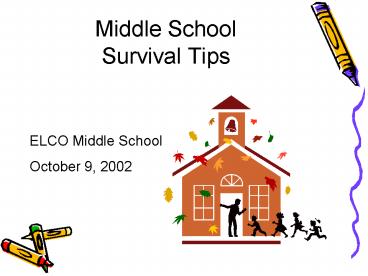Middle School Survival Tips - PowerPoint PPT Presentation
1 / 15
Title:
Middle School Survival Tips
Description:
It's been said that life is a journey, so make sure your kids have a guide. ... Middle school years can be positive ones of self-discovery for children. ... – PowerPoint PPT presentation
Number of Views:225
Avg rating:3.0/5.0
Title: Middle School Survival Tips
1
Middle SchoolSurvival Tips
ELCO Middle School October 9, 2002
2
LIFE IS A JOURNEY. KIDS NEED A GUIDE.
3
As a parent, one of your greatest dreams is to
see that your child achieve theirs. As school
counselors, we are trained to help your children
reach their full potential. Every day, students
face challenges. Tough courses, peer pressure,
eating disorders,depression, school violence.
Its a long list. And even the best parents with
the best intentions dont always know whats on
their childrens minds. Often, children are more
willing to open up to someone who doesnt have
the power to ground them or to grade them.
Someone who exists purely to guide them. Its
been said that life is a journey, so make sure
your kids have a guide. A collaborative
relationship with your childs school counselor
can reinforce that they are heading in the right
direction.
4
Why Middle School Counselors?
Middle school years can be positive ones of
self-discovery for children. Together,
professional middle school counselors, parents,
teachers, administrators, and community members
can help students focus on the journey of
transition through a collaborative effort using a
comprehensive developmental counseling program,
patience, understanding and, above all caring.
5
The Developmental Needs of Middle School Students
- Being very active, yet easily fatigued due to
rapid physical growth. - Searching for their own unique identity, turning
more toward peers rather than to parents for
ideas and affirmation. - Being extremely sensitive to comments from
others. - Relying heavily on friends to provide comfort,
understanding and approval.
6
School Counselors help children by
- Promoting positive attitudes among students
toward self, family, peers and community. - Assisting students in learning how school
performance relates to future opportunities.
- Developing and delivering classroom guidance
lessons that teach skills such as healthy
decision making, resolving conflicts, career
planning, study skills and respecting others.
7
- Working collaboratively with students, parents
and teachers to identify and remove barriers to
learning. - Providing support during personal crisis.
- Orienting new students.
- Supporting students by teaching skills for
achieving success. - Helping students to recognize and make the best
of their abilities. - Counseling with students individually and in
groups.
8
What Makes Middle School So Different?
- Changing Classes
- Your Own Locker
- More Teachers
- New Rules
- More Classmates
- More Choices
- More Homework
- More Freedom
- More Independence
- More Opportunities
- More Responsibility
9
General Homework Tips
- Make sure your child has a quiet, well-lit place
to do homework. Avoid having your child do
homework with the television on or in places with
other distractions, such as people coming and
going. - Help your child with time management. Establish
a set time each day for doing homework. Dont
let your child leave homework until just before
bedtime.
10
- When your child does homework, you do homework.
Show your child that the skills they are learning
are related to things you do as an adult. If
your child is reading, you read too. If your
child is doing math, balance your checkbook. - When your child asks for help, provide guidance,
not answers. Giving answers means your child
will not learn the material. Too much help
teaches your child that when the going gets
rough, someone will do the work for him.
11
- Stay informed. Talk with your childs teachers.
Make sure you know the purpose of homework and
what your childs class rules are. - Help your child figure out what is hard homework
and what is easy homework. Have your child do
the hard work first. This will mean he will be
more alert when facing the biggest challenges.
Easy material will seem to go fast when fatigue
begins to set in. - Watch your child for signs of failure and
frustration. Let your child take a short break
if she is having trouble keeping her mind on an
assignment.
12
- Reward progress in homework. If your child has
been successful in homework completion and is
working hard, celebrate that success with a
special event (e.g., pizza, a walk, a trip to the
park) to reinforce the positive effort. - Be positive about homework. Tell your child how
important school is. The attitude you express
about homework will be the attitude your child
acquires.
13
Make Time to ListenTake Time to Talk
- The best thing you can give your children is
time. By taking time to listen to your children,
you can get to know more about your family by
honestly answering questions and carefully
listening to replies. Here are a few questions
to get the dialogue started.
14
- If you could write a book, what kind of book
would it be? - Would you rather be rich or happy? Explain your
choice. - Do you learn more when you win or when you lose?
- If you had to lose one of your senses, which
would it be? Why? - Would you rather be good looking, smart, or
athletic? Why? - What is your favorite sport? Why?
- What makes you angry?
- What makes you laugh?
- If you could be any animal, what would you be and
why? - What do you love about school/work?
15
Questions? Comments?































